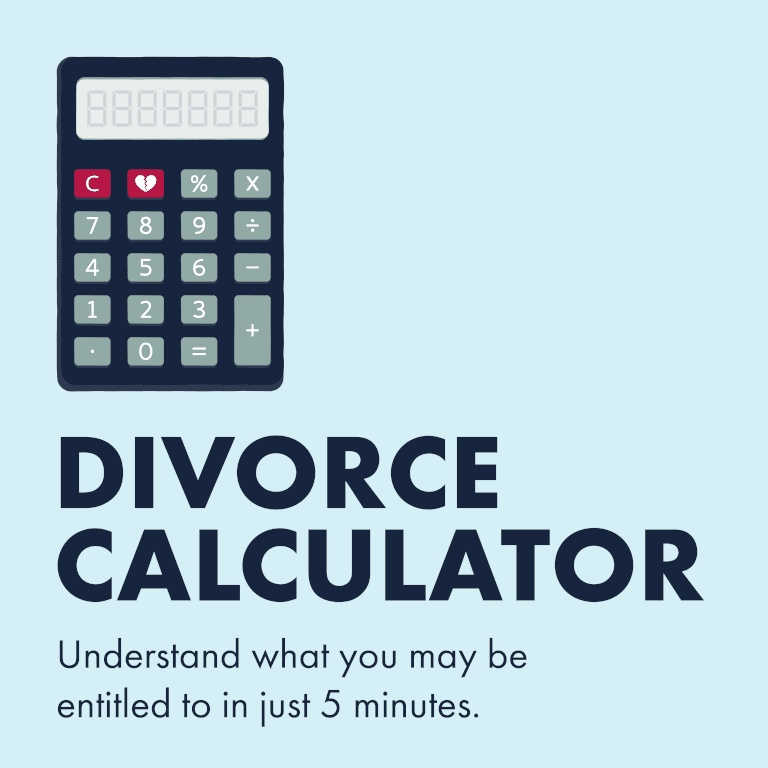Getting you settled is as important as a good settlement
We help keep things simple by making the legal side easier to understand, reducing the jargon and giving you a clear and accurate picture of your financial position.
read moreOur expert financial settlement solicitors will help you through this process with the care and attention it needs and the information required to make well-informed decisions about your financial security today and in the future.
Along with our in-house accountants and a network of Independent Financial Advisers, pension experts, business valuation experts, property experts and budget planners, you can be reassured you will get the tailored approach you need.
Key divorce finances information
-
Why get a financial settlement?
-
A financial settlement legally severs your financial ties to your ex-spouse. If you’re looking for a clear and divisive break from your partner, with no risk of future claims, a financial settlement should be included as part of your divorce. A financial settlement will confirm the division of your shared assets.
-
What is a fair financial settlement in a divorce?
-
A fair financial settlement takes into accounts the current and future needs and desires of both parties and any children, to ensure as fair and seamless a transition as possible into life post-divorce. It will have been negotiated by your Stowe lawyer to ensure the best terms possible for you, and full compliance with UK law.
-
How long do divorce financial settlements take?
-
The length of time to complete a divorce settlement will depend on how easily you and your ex can reach an agreement, whether this is through mediation, lawyer-led negotiation, other non-court dispute resolution methods or court proceedings. You will need to submit a lawyer-drafted agreement to the family court which will be approved. If the draft agreement is not approved, the process can take longer.
Our financial family law services
Forensic accountancy
Prenuptial agreements
Postnuptial agreements
Freezing orders
Spousal maintenance
Forensic accountancy
If you believe that your spouse is hiding assets during your proceedings, our forensic accounting experts are here to help. They can uncover complex assets and ensure the figures your ex declares are accurate.
Divorce accountants
Prenuptial agreements
Protecting your assets prior to marriage doesn’t have to be done maliciously. Within your prenuptial agreement, our experts will work with you to ensure your belongings are under your ownership, so if you do get a divorce in the future, your stuff is safe.
Prenuptial Agreements
Postnuptial agreements
If you didn’t get a prenup but still want to keep your assets safe, a postnuptial agreement may be the answer. It’s similar to a prenuptial contract but is done after a marriage or civil partnership. One thing stays the same, though: your items are protected.
Postnuptial agreement lawyers
Freezing orders
If you’re looking to get a freezing order, it’s important to act fast. Our financial lawyers have experience in this area and understand the importance of being reactive. We’ll work with you to ensure your spouse doesn’t cheat you out of assets you have a claim over.
Freezing order solicitors
Spousal maintenance
Spousal maintenance, also known as spousal support, is a payment from one spouse to another. Although it usually happens after a divorce, sometimes the payments can start during the divorce process. Our lawyers will be able to give an estimate of how much maintenance you will pay/ receive.
Spousal support lawyers
 Download our financial disclosure guide
Download our financial disclosure guide
What is a divorce financial settlement?
A financial settlement is a legally binding agreement designed to sort out any financial issues and fairly separate your assets once the marriage is over. You will need this if you are getting divorced and have assets to divide. The aim is to establish a fair and equitable distribution of assets and financial support, taking into account the circumstances of each spouse and the standard of living during the marriage.
Our financial solicitors can help you getting divorced when you have assets to divide. Whether your case is a fairly simple one or if you have complex high value assets, we can offer you sound advice and help you navigate the complex world of legal financial services.
There are several ways to reach a financial settlement, if both parties agree on how to settle finance and split assets, we can draft together a financial settlement for you. If not, we will be able to advise you on any negotiations and also represent you in court if needed. Our expert lawyers can advise on the right approach to take for your situation.
 Use the calculator
Use the calculator
What is covered in the financial settlement?
During the process, assets are divided into two categories: matrimonial and non-matrimonial.
- Matrimonial assets (also known as marital assets): any financial assets built up during the period of marriage. These are the primary type of assets that will be divided in a way that is considered fair and meets both parties’ reasonable needs.
- Non-marital assets: any assets acquired before or after the marriage. These are typically kept separate from the pot of matrimonial assets but can be considered under some situations. Because of these grey areas, it’s important that you work with a family law solicitor to understand how your non-matrimonial assets might be impacted during a divorce.
Any of these assets are then put into a pot where they can be divided fairly. Types of assets can include:
- Money – savings, investments and life insurance policies
- Property – the family home and any property owned individually
- Household contents
- Cars
- Pensions
- Businesses
- Personal items (Valued at over £500 must be disclosed)
- Debts, loans and credit cards
Our offices
Meet our expert divorce finance solicitors
We offer an award-winning service
 Download our Form E guide
Download our Form E guide
How are finances split in a divorce?
Finances in a divorce are typically split based on principles of fairness and need. Couples are encouraged to negotiate and reach a financial settlement either independently or with the assistance of mediators or solicitors.
Factors considered include the financial needs and responsibilities of each spouse, the length of the marriage, the standard of living during the marriage, contributions to the marriage (financial and non-financial), and any special needs such as childcare responsibilities or health issues. The division may involve splitting assets such as property, savings, pensions, and investments, as well as allocating ongoing financial support.
Financial arrangements can be settled through negotiation, mediation, or court proceedings, if necessary, with the aim of achieving a financial settlement that meets the needs of both parties and any dependent children.
-
The divorce financial settlement process
While the process can vary depending on the individuals, it will normally follow this process.
- Disclosure of assets and liabilities;
- Negotiation and mediation
- Drafting a legally binding agreement (Consent Order)
- Court proceedings (if agreement cannot be reached)
Note that if you stick to an amicable settlement, you can avoid the last stage altogether.
-
Types of settlement agreements
While an amicable out of court resolution is preferred, it is not always possible.
Financial agreements are known as financial orders. These can either be reached through mutual agreement with a financial consent order or can be ordered by the court through financial final orders when couples can’t agree.
These are the main types of agreements you will see:
- Lump Sum Order: a simple one-time payment from one party to the other to settle any necessary compensation.
- Property Adjustment Order: either transferring a property or the sale of one and dividing the assets raised through the sale.
- Spousal Maintenance Order: regular financial payments/support from one party to another. This is usually when there is a large difference in income, or one party was financially supported during the marriage.
- Pension Sharing Order: divides assets from pensions to ensure a fair distribution of retirement benefits.
- Pension Attachment Order: where a portion of one party’s pension is earmarked for another when they become payable.
- Child Maintenance Order: financial support/payments made to one parent for the support of child(s) needs. Calculated based on child’s needs and paying parent’s income.
- Clean Break Order: severs all financial ties between parties.
Everyone I have worked with at Stowe has been a comfort to their clients, not only because they are empathetic to the difficulties of financial remedy proceedings, but because they are all over the detail. It would be wholly incorrect to assume that, due to Stowe’s size, you are getting anything less than a personalised service.
Why choose Stowe Family Law’s UK financial settlement solicitors?
- We’re one of Legal 500’s ‘Leading Firms’, and we’re also named a ‘Leading Firm’ by Chambers & Partners.
- Stowe Family Law is the largest team of dedicated divorce financial settlement solicitors.
- More than 80% of all of our cases are settled out of the courts.
- Our lawyers ensure every one of our clients receives tailored legal advice that is unique to their circumstances.
- We have over 90 offices nationwide. This way, you’re sure to find an office that is local to you.
- We’re regulated by the Solicitors Regulation Authority (SRA).
- Our Client Care team will listen to your situation and pair you with the right financial settlement lawyer for your needs.
- We’ve been helping families across the UK with their divorce settlements for over 50 years.
- We have an internal forensic accounting team that collaborates with our lawyers. They have experience in pensions, valuations, property and tax.
- Our financial settlement experts are members and specialists of Resolution, so you can trust we’ll take a non-confrontational approach to your family law matter.
What people say about us
Our clients rate us on Trustpilot as ‘Excellent’.
According to Review Solicitors data, 91% of our clients would recommend our financial services to their family and friends.
Why choose Stowe Family Law’s UK financial settlement solicitors? The Law Society recognises and lists us for our specialist knowledge.
Let's ask Anon
Liza instantly put me at ease and made me feel there was light at the end of the tunnel.Let's ask Legal 500
A fresh team of experienced practitioners delivering solutions under the watchful eye of a dynamic head of department, making the most of national resources and local knowledge. Rebecca Calden- Storr has a deep legal knowledge, which she uses to give clear and straightforward advice to difficult problems.Let's ask Mr S
Grateful for the good legal advice received when I needed it. Very professional service, with care and compassion. I thoroughly recommend.Let's ask Jennifer
Chelcie at Stowe law was amazing. She was informative, answered all my questions and a summary of the meeting was emailed to within the day. Excellent service.Let's ask Mrs B
I received a fantastic service from Stowe Family Law. Miss Charlotte Newman assisted throughout my family matters emotionally and professionally through a very difficult time. Her expertise and high standard gave me the outcome I hoped for. I will be forever grateful. I would definitely recommend Stowe Family Law they excel in family matters.Let's ask Legal 500
Although the firm has a national presence, the team retains a 'local' feel.Let's ask Ms B
We approached Stowe Family Law to deal with divorce proceedings. Charlotte Newman was appointed as our solicitor and throughout she was fantastic. Very knowledgeable, helpful and behind us 100%. We couldn't be more grateful for help in matters and we were delighted with the outcome. We certainly recommend Stowe Family Law given our experience.Welcome to our Stow talks howto series I’m Joanna Dale an associate at Stow family law and in this video we will look at the types of information you need to pull together for your financial settlement in divorce making a financial agreement with your ex partner is a very important part of the divorce process decisions made now can have a lasting impact on your financial security and future to ensure a fair and reasonable settlement it is crucial that you have a clear picture of your own and any shared assets and debts and understand what income you need to live on now and in the future this requires people to gather a wealth of information and paperwork at the start of the process before they start negotiations this information can then be used to help people complete their for me which is a standard court form the information you need for your financial settlement any assets you will need the following information on any assets you and your ex partner have details of any property that you currently own by yourself or jointly including the current value of any property this should be EV valuation preferably carried out in the last six months any remaining mortgage on the property so you will need to obtain a mortgage Redemption statement if applicable the land register title number and a copy of the title Deeds for the property this can be obtained from the land registry website or your mortgage company details of any private pensions you have to get the information required you will need to contact your pension provider for a CV which is a cash equivalent transfer value statement and also ask them for any information about whether they can accept and deal with pension sharing orders as well as their costs for implementing them any bank accounts savings ises premium bonds cryptocurrency shares or any other assets that you may have you will also need to provide 12 months of bank statements and current values if any of your accounts have recently been closed you should provide proof of closure from the bank and evidence of where the funds or Investments went we should provide any income you receive including from Paid employment you should provide your last three pay slips and all your tax returns if you are self-employed or in a Business Partnership you will need detailed information and it may be helpful to ask your accountant to help you details of any additional income you get for example from invest ments or rental properties you own any benefits you may receive for example Child Benefits or Universal credits do you have any business assets you need to disclose or any insurance and endowment policies all assets you have in your sole name or joint name with your partner over the value of £500 should be disclosed and also any assets you may have an interest in such as property you share with family members any liabilities or debts you will need information on any debts liabilities you and your ex partner have including credit cards and Store card statements any loans including those you may have with friends or families including a recent statement of how much you have outstanding and what the repayment plan is any Finance agreements for example for a car Furniture electrical equipment TVs Etc your future future income needs it is important to think about what resources and income you will need to maintain a reasonable standard of living following your divorce both immediately and if they will potentially change this does not need to be exact figures but it is helpful to know approximately what your income needs are and the income you will need to meet those to then be able to negotiate a reasonable and fair settlement there are many things that you can include when working out your income needs including accommodation costs EG your mortgage or rental payments your household expenses such as utility bills council tax Etc car and transport costs children so additional costs just specific to any children you have and personal expenses to help you can find further information and a comprehensive checklist in the guide in the show notes of this video if you are looking to buy another property it is useful to research the market value for houses that reasonably meet your needs further clarify Your Capacity to borrow on a mortgage by obtaining a mortgage capacity report from a mortgage advisor it is also advised to think about any additional Capital needs you may have for example if you need to buy a car to get to work and how much this would cost you what if you cannot get the information there is a lot of information to gather for a financial settlement and it is your duty to provide transparent and honest disclosure however sometimes it may be difficult to Source all the details if you are struggling to get certain information it is important to evidence your attempts to obtain the details Financial disclosure duty is also ongoing so information can be provided as negotiations and discussions continue what happens next now now that you have all the information required for your financial settlement the next step is to complete your form e this is a lengthy form of over 30 pages and can look overwhelming in the beginning therefore it is best to work through it section by section and take your time some sections may not be relevant to you if you don’t have those assets and can therefore be left blank the importance of legal advice it is important to get legal advice as the outcome of your financial settlement can impact your immediate and long-term future and Financial Security decisions made now can have far-reaching implications family lawyers are specialists in this area and are experience in guiding clients through the completion of a form e and negotiating a financial settlement they will ensure you have all the relevant paperwork and evidence required if you are engaged in full and Frank disclosure they can advise you on whether the agreement is fair and reasonable and meets both party’s needs for more Stow talks how-to videos and further free resources visit stowefamilylaw.co.uk
Common questions about finances in divorce
Common questions about finances in divorce
-
What is a financial settlement?
A financial agreement or settlement is one which regulates how you divide your assets and deal with any income post-separation.
It is important that an agreement is formalised by a court order (called a financial remedy consent order), to make it binding.
-
How long does a divorce financial settlement take?
The duration of divorce financial settlements can vary significantly depending on factors such as the complexity of assets, whether the divorce is contested or uncontested, and how quickly agreements are reached. In straightforward cases where couples can agree on financial matters, settlements may be finalised within a few months. However, more complex cases involving high-value assets, disagreements over property or pensions, or disputes regarding income may take considerably longer, potentially extending over several months or even years if court proceedings are required.
-
When does the financial settlement have to be reached?
The financial settlement can be reached at any time. However, the court only has the power to approve a final order (financial remedy consent order) once the conditional order of divorce has been pronounced.
-
Do you need a financial settlement to get divorced?
You can legally get divorced without a financial settlement, but it is typically not recommended. This can leave you vulnerable in immediate post-divorce matters but also to potential claims on your finances in the future.
-
Can settlements be revisited after divorce?
It is usually seen as a final agreement between the two parties, but there are exceptional circumstances where it can be reopened. These can be due to materials not being disclosed in the initial stages, significant life events or fraud.
-
What happens to the family home?
A shared property is usually the biggest asset to divide in a divorce. The most simple solution is often to sell the property and divide the money from the sale. However, if one party is able to purchase the other’s share, they can take sole ownership.
When children are involved, the best solution can be to maintain joint ownership of the home with one party residing in it until the children reach a certain age.
You could agree to transfer a portion of the property’s value as a financial settlement. By doing this, the partner giving up some ownership maintains an ‘interest’ in the home, meaning they’ll receive a percentage of the final sale price.
-
How are pensions handled?
Pensions are often ignored, but they are one of the most significant assets a couple has. This can be damaging for women as often 90% of the pension wealth is held by one party. Usually the man in different sex couples.
The total value of the pensions that each party has built up is considered. This means all your pensions, not just the ones that each of you held before you were married or in a civil partnership.
When discussing pensions in divorce, there are two primary options for couples: pension sharing and pension offsetting. The capital values, projected income in retirement, and rules of the individual pension scheme will all help inform which option will work best for you. See more on divorce and pensions here.
-
How are businesses handled?
This can depend on how the business is owned and how much it is worth, but the courts can look at businesses when assigning assets. This can be done by lump sum payments, shares or even selling the business.
-
Are overseas assets taken into consideration?
Both parties have a duty to disclose all assets held by them, whether in the UK or abroad, and the court will take into account all assets when deciding how to divide the asset pot.
Orders can be made against foreign assets such as property, but there may be further action required in that jurisdiction to enforce any orders. The court cannot, however, make a pension share against a foreign pension scheme.
-
What if my ex won’t cooperate?
Sometimes one or both parties refuse to cooperate, this can also be known as stonewalling. If this is the case then the court can intervene and facilitate the process and allow for a solution to take place. The Court can also order imprisonment or impose fines on a party who is in breach if they are found to be in contempt of Court.
-
Once the divorce is finalised, can I get a 'clean break' where finances are concerned?
As part of any final financial order, there will almost always be a capital clean break, meaning that neither party can bring further claims against the other for capital or pension provision.
However, a complete clean break is achieved when income claims against each other are also dismissed. This will depend on whether any ongoing spousal maintenance order is made.
Latest advice
Newsletter Sign Up
Sign up for advice on divorce and relationships from our lawyers, divorce coaches and relationship experts.
Privacy Policy Close newsletter modal


















